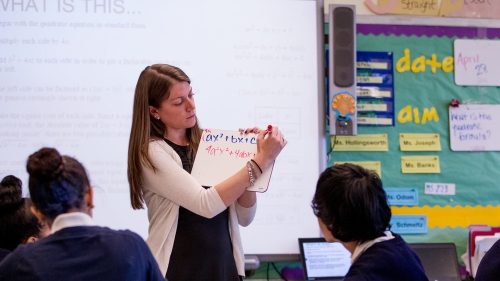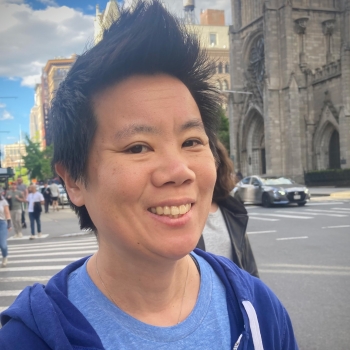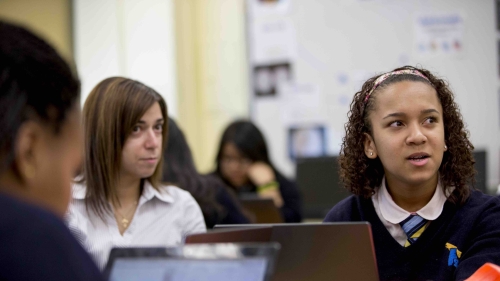

I will not be accepting new doctoral students for the 2026-2027 academic year.
My work is broadly concerned with issues of equity and justice produced by the institution of US schooled mathematics. I study the mathematical activity and learning of people across settings, and the role of bodies, technological tools, space/place, and participation structures. I begin with the assumption that all children have the potential to engage in rich and complex mathematics, and that students' experiences in typical classroom mathematics make contact with just a small fraction of the possibilities for learning. What’s more, I’m concerned with how dominant forms of mathematics instruction, and how the assumption that Western mathematics is the only mathematics of value, actively and systematically marginalizes particular populations of learners. I’m interested in developing new accounts of what might count as "prior knowledge," "learning mathematics," and mathematics in general that might support the success of a broader set of mathematics learners. An important move for my work is to de-center school as both: the place we assume most learning happens, and the place research focuses.
The studies I conduct tend to fall into one of two categories. In the first, case studies of naturally occurring activity, I use ethnographic and micro-ethnographic methods to investigate how participants make sense of mathematical activity in which they engage, and how they work together to learn and to accomplish the tasks pertinent to the setting or across settings. For example, I have been involved in studies of a group of archaeologists who study the lived experiences of Inkans under Spanish colonial rule, a competitive high school marching band, and skateboarders in local skateparks. I have just wrapped up a study of a company that designs custom crates for clients' art objects. Currently my research team and I are investigating an afterschool documentary filmmaking program, and following youth across settings to better understand their learning as emerging from pathways, rather than individual contexts.
In the second category of work, I conduct design experiments to investigate how findings from case studies might inform instruction. These design experiments tend to revolve around tasks that leverage the ways of (and structures for) learning and doing mathematics found in the case study settings. These studies are meant to pilot and explore the features of novel, designed tasks, but also to expand our understanding of findings from the case studies. I have recently completed analysis on designs of what I call Walking Scale Geometry and Walking Scale Number Lines for secondary students, which involve groups of students in large spaces using their whole bodies and everyday materials to solve geometry and quantitative reasoning problems.
I'm currently past-president of the International Society of the Learning Sciences, and co-Editor in Chief of Cognition and Instruction.
Here's a blog post I wrote about bodies and mathematics! (the blog has since gone away, but I've linked the original text)
Selected Publications
- Ma, J. Y., Velamur, A., Turan, N., Blake, A. R., Vogelstein, L., Kelton, M. L., Barrales, W. (2023). Public common-sense assumptions about mathematics: Racing in a ma(th)rathon. In Proceedings of the Twelfth International Mathematics Education and Society Conference. São Paulo, Brasil: MES12.
- Blake, A. R., Chen, G. A., Ostrowdun, C., Murphy, C. T., Vogelstein, L., Radke, S. C., Krishnamoorthy, R., Fisher, K. S., Kelton, M. L., & Y., J. (2023). Contesting with feeling: Childhood in and through public education. In Blikstein, P., Van Aalst, J., Kizito, R., & Brennan, K. (Eds.), Proceedings of the 17th International Conference of the Learning Sciences - ICLS 2023 (pp. 1150-1153). International Society of the Learning Sciences.
- Danish, J. A., & Ma, J. Y. (2023). Sociocultural and cognitive perspectives on learning: What is learning, for whom, and to what end? In R. J. Tierney, F. Rizvi, & K. Ercikan (Eds.), International encyclopedia of education (4th ed., Vol. 6, pp. 1–11). Elsevier. https://doi.org/10.1016/b978-0-12-818630-5.14001-1
- Radke, S. C., Vogel, S. E., Ma, J. Y., Hoadley, C., & Ascenzi-Moreno, L. (2022). Emergent bilingual middle schoolers’ syncretic reasoning in statistical modeling. Teachers College Record, 124(5), 206–228. https://doi.org/10.1177/01614681221104141
- Kelton, M. L., & Ma, J. Y. (2020). Assembling a torus: Family mobilities in an immersive mathematics exhibition. Cognition and Instruction, 38(3), 318–347. https://doi.org/10.1080/07370008.2020.1725013
- Kelton, M. L., & Ma, J. Y.* (2018). Reconfiguring mathematical settings and representations through multi-party, whole-body collaboration. Educational Studies in Mathematics, 98, 177-196.
- Ma, J. Y., & Hall, R.* (2018). Learning a part together: Ensemble learning in a competitive high school marching band. Instructional Science, 46, 507-532.
- Ma, J. Y. (2017). Multi-party, whole body interactions as resources for mathematical activity. Cognition and Instruction, 35, 141-164.
- Ma, J.Y. (2016). Designing disruptions for productive hybridity: The case of walking scale geometry. TheJournal of the Learning Sciences, 25, 335-371.
- Ma, J. Y., & Munter, C. (2014). The spatial production of learning opportunities in skateboard parks. Mind, Culture, and Activity, 21(3), 238–258. https://doi.org/10.1080/10749039.2014.908219

